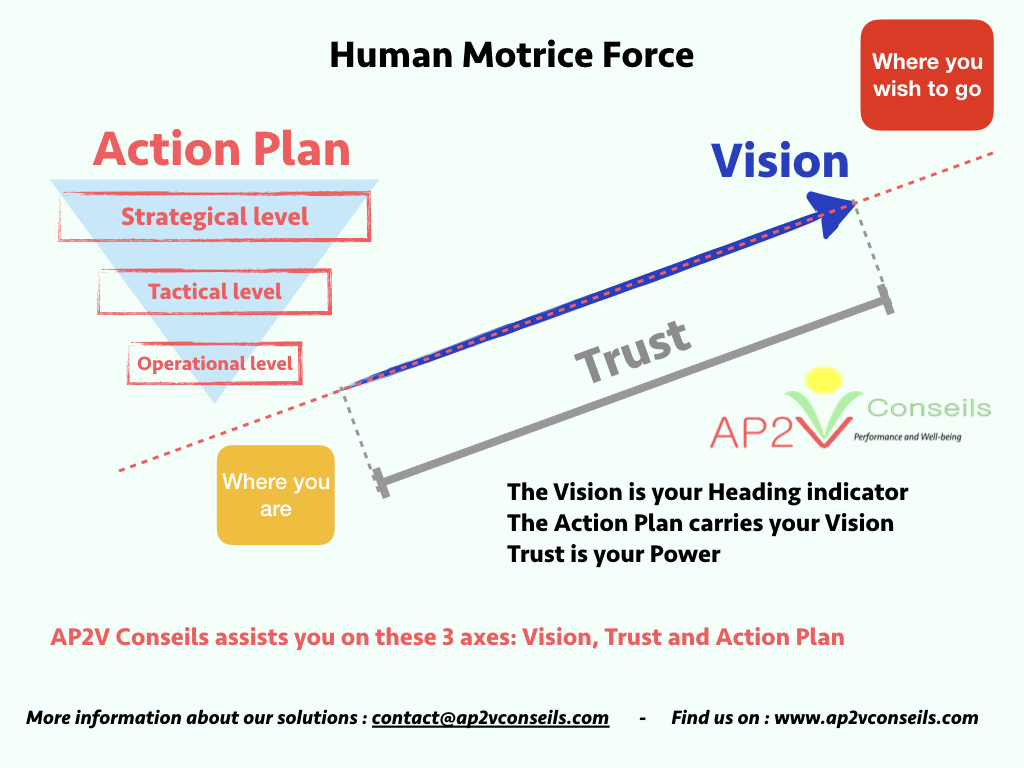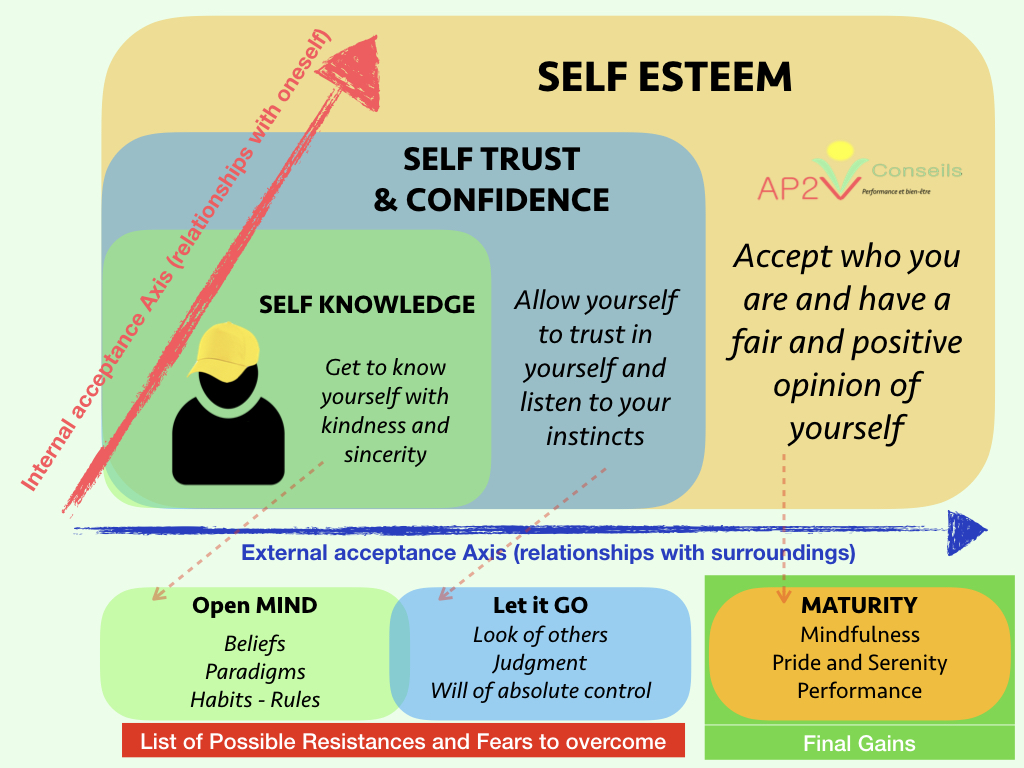What if well-being at work was the key to today's and tomorrow's business performance ?
The quest for performance has never been more pervasive than in the current world of labor, whether individual or collective-wise speaking. The economical context, stakes, customer requirements are only factors of amplification of this phenomenon, the real question that everybody asks is: "how can you do always better with such or less ?"
This inexorable race begins to have serious consequences, especially at the Human level : depression, burnout, sick leave, demotivation, lack of commitment, etc ... What causes the opposite effect of the one sought : the performance falls !
To go beyond this sometimes feeling of helplessness and fatalistic, don't they not exist sustainable solutions, durable, relatively easy to implement and controlled cost to break this dynamic ? In this article, AP2V Conseils gives you a recipe that is not a spell of the kind but a concrete, proven and efficient way to support and develop the performance of individuals, businesses and organizations.
Well-being and Quality of Life at Work (QWL)
Before going any further into more detail in exploring the possible benefits of a concrete and sustainable welfare of employees in companies, it is important I think to make the following distinction: "Happiness does not mean well-being"
Indeed, it would be wholly inappropriate to expect a company or an organization to assume alone the responsibility of the happiness of its collaborators, so much this notion of happiness is personal and includes aspects that exceed largely the simple professional sphere.
Well-being at work is the responsibility of the employer, with the notion of prevention of Psychosocial Risks (PSR), the concept of Quality Safety Environment (QSE) or, as more and more companies have already put in place, a Quality of Life at Work (QWL) approach that in some ways can be linked to the older notion of Corporate Social Responsibility (CSR) with the example of the sick leave : some sick leaves can be linked to poor working conditions (thus directly related to QSE and QWL), which for example has the consequence for the company to increase the cost of compensation and reimbursement Associated medical expenses where applicable.
Article L4121-1 of the French Labor Code: "The employer shall take the necessary measures to ensure the safety and protect the physical and mental health of workers." which could be find more or less in the same way in other European or International countries
Nevertheless, once this legal part is on the table, we still have to agree on criteria and "acceptable" thresholds, on what measures to adapt and how to put into practice these measures ... which is very often where discussions begin…
In order not to enter into these discussions, I think it is important to look at how parameters such as the atmosphere and working conditions, the feeling of professional recognition or the feeling of belonging can positively impact the functioning of the workplace business and therefore its performance, when they are present and felt positively. These parameters are part of what I would call intangible QWL, as opposed to the material QWL relating to the quality of the work premises or tools made available to employees, who are often the first components treated in QWL because they are the most obvious and palpable.
Trust and confidence are at the core of performance dynamics
To be interested in performance is very often to question the causes of non-performance ; classically, the following four causes are retained: the rate of absenteeism, the Turnover rate, the non-compliancies and the inefficiency at work. Beyond the phenomena of correlation and amplification linking these 4 parameters, it is very common to discover a common origin: loss of commitment and loss of motivation in people.
But why and when did people say no, when did they throw in the towel ? What can characterize this rupture ?
Well, these people have done it very often just when they have lost confidence in the organization and the company, or in their representatives. Indeed it is not uncommon to note that when people are demotivated and disengaged, they tend to equate the company with its representatives (Management, leaders, etc.).
In Physics, we represent the driving force (mechanical for example) by a mathematical tool called a vector. This vector is characterized by three components: a norm, a direction and an orientation.

In the same way, the "Human Driving Force" can be represented by a vector having the confidence (or trust) for norm, the actions plan for direction and the vision for orientation. It should be noted that the actions plan literally carries the vision and that the stronger the confidence or trust, the more the driving force will be too !
So beyond the legal and humanistic dimension, from a CSR point of view, a quality of life at work (QWL) that allows employees to feel good, this has the main benefit of reinforcing the confidence that employees have for their business and organization, and therefore the level of trust they can place in their representatives by deed. Indeed, if I feel good in a company, it is because the Management pays attention to me, so I can trust him. This mechanism is also valid for a manager with his team.
It remains the responsibility of managers and decision-makers of companies and organizations to define and communicate the meaning of their actions, in a suitable way, so that it makes sense for employees on their vision, their values and on their strategy to get there. Not to mention in parallel the absolute necessity for any person in a managerial position to implement an adapted and caring management style, accompanied by a high level of Excellence and Mastery of soft-skills required to the exercise of the role of manager, including active listening, stance, relational, emotional, adaptive intelligence, or empathy and assertive communication to name only the main ones
This mechanism is applicable to any scale of organization: from the binomial to the multinational. The human keys to overall performance remain the same : trust, strategy and vision. It should also be noted that these keys to success are similar to those of Kotter change management.
Well-being at work is therefore at the foundation of an efficient and sustainable business.
Other benefits of well-being and confidence in performance
When employees trust the organization and their representatives, and they operate in a climate of trust between colleagues, a significant amount of energy that was previously used for non-productive tasks (defending, protecting, accusing , justify, lie, etc.) can be reinvested in productive tasks, which has the direct consequence of rapidly increasing the overall performance of the company or organization.
In a fairly similar way, a high level of well-being among employees can promote the assertive communication and the culture of transparency, which also contribute to increase the performance. I feel good, confident, so I'm not afraid to say what I think or express my ideas.
Finally, when employees feel comfortable in their work environment, they are more creative and make full use of their skills, capabilities and potential, which in the short, medium and long term enhances the performance of the company and the organization.
How to settle (back) confidence and trust ?
We have seen that the well-being of employees fosters the development of a sense of trust and that performance requires governance to communicate its strategy and vision, in order to create a driving force for commitment and motivation.
However, an individual's high level of trust, perhaps, is a complex and slow process that often requires going through the different stages :

Companies and organizations contribution in this case is therefore to set up a working environment conducive to this work of personal development, without releasing the responsibility of the people of the choice and the consequences of their actions. This type of work environment is a work environment where people can feel good. Concretely, this often happens when people feel competent, signifiant and likable, as William Schutz says in his theory of the Human Element, which could in itself constitute the foundations of the immaterial QWL we are referring to higher in the text.
It is also important for managers and decision-makers to open their field of beliefs and knowledge to trust that other ways of doing things are possible.
Because let's not forget that the 6 words that run a business for sure are:
"We never did it like that"
AP2V Conseils offers missions that allow you to perform differently through the lever of well-being at work, combining organizational consulting, personal development traineeships and professional coaching.
Author: Florent POULET, French state Certified Professional Coach & Engineer - Founding President AP2V Conseils - Copyright All Rights Reserved December 2018




Comments powered by CComment